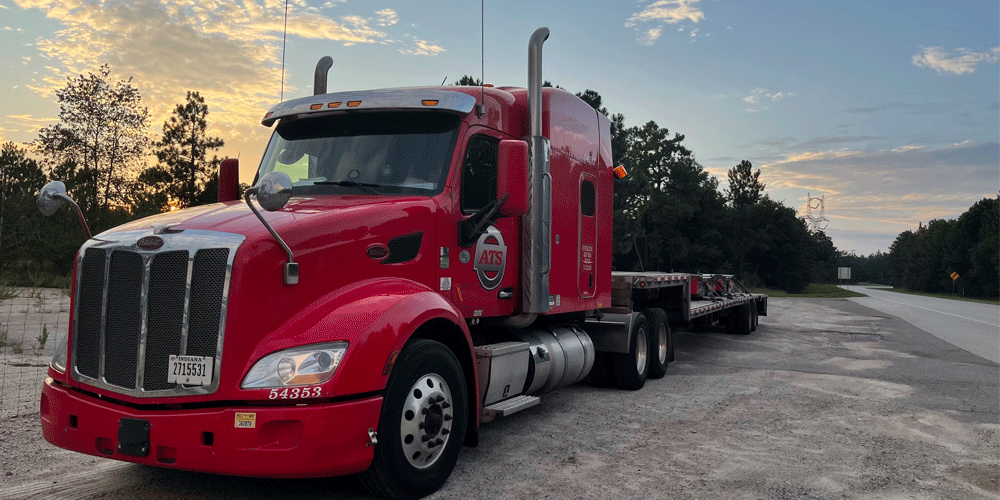Should I Lease a Semi-Truck? [Pros & Cons for Truck Drivers]
Robbie came to ATS with ten years of transportation experience under his belt. He has worked at ATS for the last seven years as a driver consultant. He prides himself on using his industry knowledge to assist drivers in making the best decisions for themselves.
Are you a new truck driver? Are you also ready to hop into a lease?
Wait, wait, wait. Slow down!
I can understand your excitement. You’re new to the industry and you’re excited to operate your own business. However, the trucking industry is tough. Being a truck driver is no easy job and if you’re new to the industry, you have even more to learn and an entirely new lifestyle to adapt to.
If you add leasing and operating as an independent contractor on top of that, you could be setting yourself up to fail — or at the very least struggle quite a bit.
I’m a driver recruiter at Anderson Trucking Service (ATS) and I help advise truck drivers on their paths every day. My job includes helping drivers like you determine if being a company driver or independent contractor (lease driver) is right for them.
In this article, I’ll help you understand whether or not you should lease (whether you're a new truck driver or not), and what you might want to do before you pursue leasing.
What Should I Consider Before Leasing?
The short answer to the question of whether you should lease as a new driver is no. Knowing what I know as a recruiter, I wouldn’t recommend a loved one or a family member become a lease driver when they’re brand-new to the industry, and I wouldn’t advise you to do it either. It’s a tough gig. Even experienced drivers can fail when leasing.
You don’t know what you don’t know until you know it. And there are a lot of finer details you learn about trucking — not to mention skills you hone — after you’ve spent some time in the industry. If you've been in the industry for a while now, you might be ready.
Here are some things to consider when you're thinking about leasing for the first time.
Consideration #1: Expenses Add Up Quickly
For starters, let’s talk about expenses. When you lease a truck and operate as an independent contractor, you’re the one taking care of all your expenses. You might make $5,000 one week, but after you subtract your expenses, you might only be taking home half of that.
You’ll pay for your truck, maintenance, fuel, and insurance in addition to other random expenses the company would otherwise cover for company drivers. Taxes aren’t taken out of your check either, because you’re considered an independent contractor. You have to get good at budgeting and setting money aside to pay taxes during tax season. Many drivers work with a financial service or a tax provider to assist with this.
Not only that, but if you want to take any time off, your expenses don’t pause. If you don’t have money set aside to cover your truck payments and other weekly expenses, you can be in debt when you get back on the road after a week-long vacation.
Managing your expenses can be tough. You need to make sure you’re earning enough money to cover your operating costs and the bills you have at home. If you’re new to the industry, it can be tough to juggle all that. With more experience in trucking, however, balancing your expenses is a lot more manageable. So, depending on how long you've been in the industry, you might be ready for this responsibility.

Consideration #2: You Have to Find Your Own Insurance
As an independent contractor, you don’t have access to company-sponsored benefits, including health insurance, life insurance, and retirement accounts. That’s something you’ll have to find and secure on your own. And it’s just another expense to add to the list.
Some carriers may offer truck and equipment insurance, but you’ll have to source the open market or your state’s marketplace to find health insurance. You’ll have to work with your financial institution to set up retirement accounts, too. Then it’s your responsibility to manage these accounts.
It’s just one extra task to take care of in a sea of tasks that can be overwhelming as a new driver.
If, on the other hand, you've been a company driver for a few years, you may very well be ready to take on this challenge. You probably have a few resources in your back pocket already.
Related: How to get benefits as an independent contractor
Consideration #3: Freight Lanes are Confusing
If you’re new to trucking, getting the hang of freight lanes and freight rates can be tricky. As an independent contractor, you have some choice over the freight you will and won’t run. Your driver manager will give you a few freight options and you’ll be able to choose among them. If you don’t have experience in the industry, you might be choosing blindly.
What’s a good freight rate? What areas are the best places to run in?
It can take some time and familiarity with the industry to get a good grasp on the best running areas and how seasonality plays a role in freight availability. You may take a load thinking it pays reasonably well, but after you deliver that load, you can’t get another load to get you out of that area. Or, perhaps the loads coming out of that area are so cheap that it’ll cost you money to get out of there.
Not only that, but you have to have a great understanding of how much you need to earn each week (and even each load) to break even and earn a profit. With time, this will become second nature to you.
In fact, it may be already if you've been paying extra attention to this as a company driver! If you've been working closely with your dispatcher to choose loads, you may already have this part figured out. If you're doing some of this already, it might make sense for you to take the next step and hop into a lease.
Related: Headhaul and backhaul markets
Consideration #4: Fuel is Expensive
Fuel is just another expense you have to add to your list. But, you also have to think about the logistics of getting fuel and conserving it. While you don’t have to pay for fuel as a company driver, you learn strategies to conserve it and boost your fuel efficiency.
The more experience you have as a truck driver, the more you'll get good at knowing how much fuel you need per load, when you need to fill up again, and how to easily slide fuel stops into your day without it eating up your clock. As an experienced driver, you may already be good at this part but you don't want to pay for fuel. If that's the case, you may not be ready to lease just yet.

Consideration #5: Trip Planning is Complex
Trip planning is an acquired skill. More experienced drivers can trip plan pretty quickly, but it takes some time when you’re a new driver.
Trip planning requires you to plan out your route and all your stops for the day — including where you’ll get fuel, where you’ll take your mandatory 30-minute break, and where you’ll park when you call it quits for the day. You’ll choose a few options for fuel stops and truck stops just in case your plan doesn’t go according to schedule.
Trip planning helps you understand where you’re going and what you should know about the route you’ll be driving on. This includes figuring out the best way to get in and out of a shipper’s yard. It helps keep you prepared for anything, like delays or road construction.
Trip planning helps you avoid getting lost or driving hundreds of miles outside of your route to find parking or fuel. In doing so, you’ll also get better at managing your Hours of Service (HOS).
It becomes easier the longer you’re driving because you become familiar with roads you regularly traverse and you learn which truck stops you do and don’t like. As an independent contractor, you'll be choosing and coordinating your loads, so you want to be very good at trip planning to make the most money.
Consideration #6: Maintenance is Expensive
As a company driver, maintenance costs are taken care of for you, but you learn about getting into the shop for service intervals and how long it takes for repairs. You get practice scheduling repairs and fitting them into your schedule so it doesn’t take too much time out of your schedule — time you could spend making money on the road.
You also have to navigate what you’ll do while your truck is in the shop. Will you get a hotel? Go home? You’ll have to pay for both of these options out of your own pocket and you’ll have to pay for the maintenance. As a new driver, figuring all of this out can be intense and overwhelming.
Now, if you're not new to trucking, you may be good at figuring out the logistics of getting into the shop. However, you've never experienced paying for those repairs. No matter how long you've been in the industry, paying for repairs can be tough to get used to.
Why You Should Gain Experience Before Leasing a Semi-Truck
Trucking definitely isn’t an easy lifestyle, especially if you decide to do over-the-road (OTR) driving, where you’ll be away from home for at least two or three weeks at a time.
“Now, Robbie,” you might be saying, “I grew up around this lifestyle. My grandfather was a trucker. My parents were team truckers for a while before my dad took over. I know this lifestyle.”
To that I still say, please carefully consider the choice to lease at the early stages of your trucking journey. Some companies (ATS being one of them) won’t even allow you to be a lease driver until you have a set amount of experience. Even if you have intimate knowledge of the industry because you’ve seen family members do it, you should still take the time to be a company driver first to get your sea legs, so to speak.
Not only that, but if you’re totally new to trucking, there’s no way to know if you’ll like it or not. Let’s say you put a down payment on a lease and then three weeks in, you decide you don’t like trucking. You can certainly turn the truck back in, but you’ll have lost all that money on a down payment.
You could also decide you don’t like the company you leased with and want to switch trucking companies. Starting over at a new trucking company while you’re a new driver can be incredibly difficult and it can impact your professional life long-term.
Make sure you can handle the lifestyle before you commit to a lease. To succeed in trucking takes a unique individual and it’s a tough mental grind. So even if you have been in the industry for a bit, remember that leasing is a big step up. It's not right for everyone (and that's okay).
Focusing on Safety First
Not only do you need to figure out if you even like being a truck driver, but you also need to focus on honing your skills and getting good at the job. As I said before, trucking is a difficult job. It’s not just the administrative side of trucking you have to think about — at the most basic level, you have to focus on the task of driving.
You aren’t just sitting behind a steering wheel. You’re maneuvering around narrow city streets, dealing with the motoring public who thinks you’re in their way, backing into narrow customer sites, navigating to new destinations, working with customers, meeting appointment time slots, and trying to balance your HOS. You’re learning new technology, lingo, and more.
Safety is a big deal as a truck driver. Truck driving is one of the only industries where you’re operating heavy machinery around people — from small children to grandparents. You’re driving on the road alongside them every day. If you don’t do your safety checks and follow safe driving practices, accidents can happen.
Make sure you spend at least six to 12 months as a company driver (if not longer), where you can focus predominantly on getting the hang of the industry and honing your truck driver skills. Then you can try leasing and the business side of trucking.
Explore Your Options
I’m certainly not saying that leasing is bad or you should never lease. It’s a great business path and countless truck drivers choose the leasing lifestyle and love it. I’m just saying that, if you're a new truck driver considering whether to lease a truck, it's essential to tread carefully. As I said before, even experienced drivers fail if they aren’t prepared for the major changes that come with leasing.
The trucking industry demands a deep understanding of both the operational and administrative aspects, making it a challenging field to navigate, especially for newcomers. While the allure of being your own boss and potentially earning more might be enticing, the practicalities and complexities of the job cannot be underestimated.
Before venturing into the world of leasing, it's advisable to gain substantial experience as a company driver first. This will allow you to hone your driving skills, understand the industry intricacies, and get a clearer picture of whether trucking is a suitable long-term business decision.
Taking the time to build a strong foundation through experience and skill development as a company driver is essential before embarking on the more complex path of leasing as a new truck driver.
Check out the best companies to work for as a new truck driver. These companies will help you get the experience you need before leasing.
And, you just may decide you want to stay a company driver. Here are the pros and cons of being a company driver.
To go one step further, you can take a quiz to see if being a lease driver is right for you.
![Should I Lease a Semi-Truck? [Pros & Cons for Truck Drivers]](https://blog.drive4ats.com/hubfs/Images/Blog/New%20Driver%20Lease%20Pros%20and%20Cons/AdultDriverBehindwheelFeatured.png)


